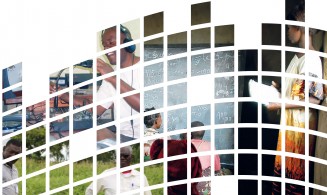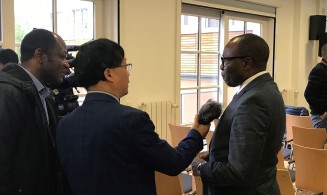

GRALE III unveiled in Eastern and Southeastern Europe
Representatives of 17 countries gathered in Belgrade, Serbia, on 26 January 2017 to mark the launch of the third Global Report on Adult Learning and Education (GRALE III) in Eastern and Southeastern Europe.
UNESCO Institute for Lifelong Learning (UIL) was delighted to partner with the International Council for Adult Education (ICAE); Serbia’s Ministry of Education, Science and Technological Development; the University of Belgrade; and the Adult Education Society of Belgrade for the event, which was both creative and engaging. Discussion at the event was encouraged using different approaches: these included the forming of working groups to exchange thoughts and ideas. Topics included intersectoral approaches to adult learning and education (ALE), and regional contribution and collaboration concerning the follow-up processes and social partnerships in connection with the 2009 Sixth International Conference on Adult Education (CONFINTEA VI). Participants at the event also shared their experiences, laid the foundation for future cooperation, and identified mutual challenges and common areas of action.
Mixed progress: ALE in Eastern and Southeastern Europe
GRALE III findings are based on extensive surveys of 139 countries, including 12 countries from Eastern and Southeastern Europe, to ascertain the implementation of the Belém Framework for Action (BFA). Progress in the region is mixed: for example, ALE remains underfunded in many countries in the region, with only four countries reportedly spending 1 per cent or more of their national education budget on ALE.
However, positive changes have also taken place: 10 countries in the region say their ALE policies have improved overall, and seven out of 12 countries suggested that ALE has had a positive impact on health, knowledge, attitudes, skills and values. With regard to government input, a little more than half reported introducing significant methods for monitoring ALE.
‘All of the countries of our sub-region are faced with challenges of unemployment and insufficient economic growth. It is clear that education and adult education has to be adapted to the needs of industry and economy so that it becomes an essential tool of economic growth,’ confirmed Mr Dragan Županjeva, Ambassador in the Ministry of Foreign Affairs in Serbia and Coordinator for the Economic and Social Council of the UN Sustainable Development Goals and the Agenda 2030.
Working together to promote the benefits of ALE across sectors
ICAE Secretary General Katarina Popovic underlined the need for greater cooperation, both within and among countries. In this context, GRALE III found that cooperation on ALE is indeed improving in the region and that interdepartmental collaboration is key in reaping the benefits of ALE. Twelve countries claim to have strengthened interministerial cooperation after recognizing that partnerships between different communities and stakeholder groups are mutually beneficial. GRALE III includes compelling evidence that ALE brings benefits for health and wellbeing, employment and the labour market, and social, civic and community life.










